Why the Indigenous All Stars protest isn’t as simple as you may think
The NRL has decided the national anthem will not be played before Saturday night’s All Stars match - but the issue is far from cut and dried writes PAUL KENT.
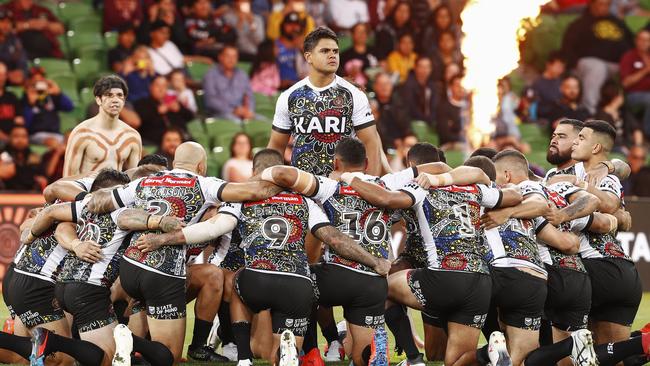
Teams
Don't miss out on the headlines from Teams. Followed categories will be added to My News.
TIPS.COM.AU: Over $2 million in prizes to be won
LEARN THEM: The five golden rules of footy tipping
Preston Campbell was always the little man who went big and so it was never a surprise when Campbell thought there could be a game that was bigger than merely 80 minutes of football.
His original idea for the All-Star game was two-fold.
He wanted a celebration of the Indigenous contribution to the game and to encourage Indigenous Australians to learn more about their identity.
It was kind and tremendous and ambitious, like the architect of it all.
Both dreams will have failed when the Indigenous All-Stars run on to the park tonight. The game will no longer be a celebration, but a protest match.
The players are guilty of hijacking Campbell’s intent for their own gain.
LIVE stream Indigenous All-Stars v Maori Kiwis in the 2020 Harvey Norman NRL All Stars match on KAYO. New to Kayo? Get your 14-day free trial & start streaming instantly >
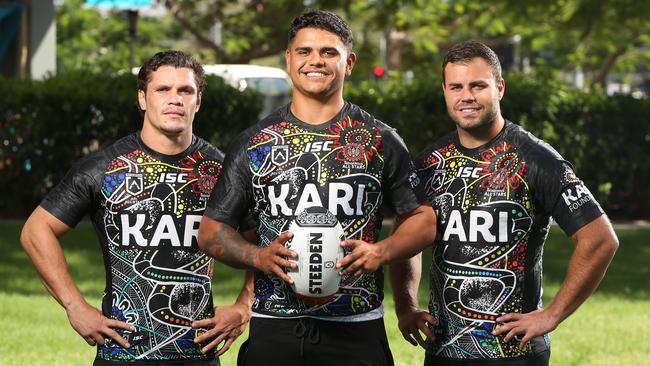
The best outcome they offer, when asked, is to hope “people higher up” will notice their protest and address their concern over the national anthem. Really, they have created a problem and used a game but offered no solution.
And the NRL is complicit, too. The League’s focus should be running its sport, for all involved, and not making political stances.
Yet at the moment they bathe in the warm praise of the combatants.
“It’s a step in the right direction,” Latrell Mitchell said earlier this week. “Obviously the commissioner of the NRL had a meeting with us and he took the first step for us, and we can’t thank him enough, and I think for us to get this it really means a lot.
“It’s really good to see the NRL getting behind us and putting the front foot forward and letting us have our voice.”
A voice for what, though?
It is not the NRL’s job to drive social change, they have enough trouble running the sport.
Recognise and adapt, sure, but the game has always shown it is inclusive and progressive.
One of the code’s great boasts is that the first Aboriginal to captain Australia in any sport was the game’s Arthur Beetson, one of the Immortals. It happened because Beetson was simply recognised as the best man for the job. He could never be a political puppet.
Aboriginal life expectancy is below non-Indigenous people and so is poverty. There are real problems that need to be fixed.
FOOTY TIPS! Join Australia’s best footy tipping competition for your chance to win big. Add our experts to your league and join now at TIPS.COM.AU.
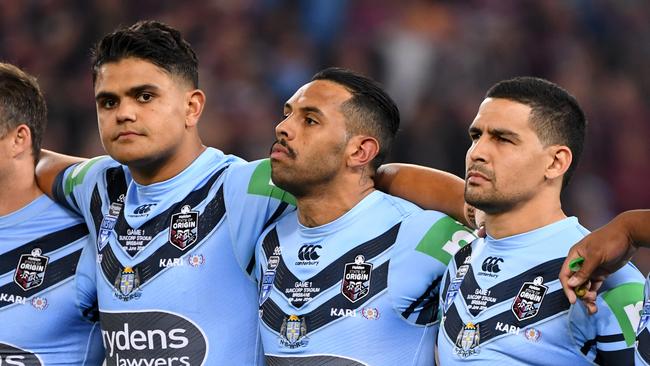
But, as Artie showed, rugby league was always a moral compass for the country. Equality in rugby league is better than it is in society. Teammates rely on each other, black or white, and support each other.
But with an opportunity to lead the way, as this game once did, they instead create a division.
As for the anthem, some people happen to like it. It hardly inspires me, but each to their own.
But it seems the players are upset about recent racists comments towards Mitchell on social media and have gone looking for a cause for solidarity and the anthem is it.
Johnathan Thurston, Wendell Sailor, Gorden Tallis … they were all happy to sing it the generation before.
Today’s players say they are genuinely upset about its wording, which is okay. Nobody can tell them how they should feel; it’s a personal emotion. And they are free to complain and free not to sing if they wish.
Living in a free country allows that.
The NRL’s decision to cancel the anthem to accommodate their complaints has shifted tonight’s mood from a celebration to a protest.
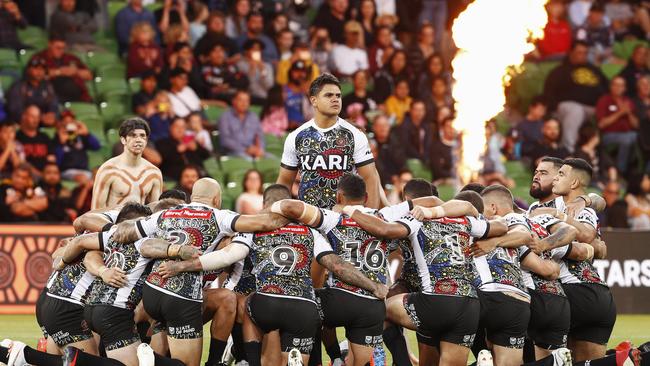
Some of the players seem to have picked up on one narrative.
Racist anthem, racism in the game, second class citizens.
There are some indigenous leaders who believe parts of the Aboriginal narrative is open to interpretation.
The biggest is that they were treated as “flora and fauna” until the 1967 referendum, when they were finally permitted to vote.
It is just not that simple
Warren Mundine, the politician and Aboriginal leader, has found records of his grandfather, Harry Mundine, voting in 1915.
Just this week Mundine called a couple of silky voices on WSFM to tell them it is factually wrong to continue saying that Aboriginals were not allowed to vote until the 1967 referendum.
Aboriginals were given the right to vote in NSW, Victoria, Tasmania and South Australia when they were declared “British subjects” - the same as everyone living in Australia at the time (so no racial separation) - in the 1850s.
Queensland and Western Australia resisted, not giving Aboriginals the right to vote until 1965 and 1962 respectively.
The referendum was held to Federalise Aboriginal affairs, which until then were under State control.
The 1967 referendum is so misunderstood it is also often quoted that Aboriginals were treated as “flora and fauna” until then.
Aboriginals were never treated as “flora and fauna”.
“There never was a flora and fauna act,” Mundine said. “Nobody has ever been able to find such an act. Anne Twomey, the constitutional expert, has said she can’t find any such act.”
It is a popular misconception still widely published, either through innocent ignorance or mischievous agenda, to highlight the mistreatment of Aboriginals.
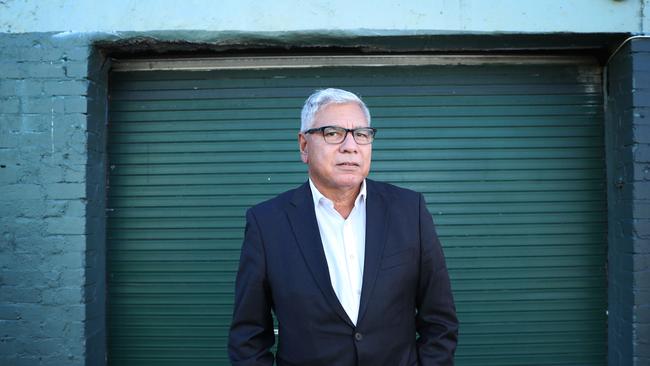
Eric Simms, South Sydney’s great fullback, was on his way to playing in the 1970 World Cup when he was nearly prosecuted for failing to register for conscription midway because he believed there was the flora and fauna act.
It was the Vietnam War and, like many, Simms, did not think he was considered a citizen and so thought he was exempt from the draft.
Only the court’s sympathy at his misunderstanding stopped him from being prosecuted for draft dodging.
Mundine brings understanding and moderation to an argument, something the NRL might have considered when it cancelled the anthem and politicised the game.
Most of the players refuse to sing the anthem because they take offence at the “For we are young and free …” line, saying it does not recognise a culture that is 40,000 years old.
And that argument is true.
But there has to be a starting point and under the current system of government Australia, which began with Federation in 1901, Australia is, as the collective noun, young.
When the anthem begins “Australians all …”, it is truly meant to reflect all of us under this new understanding.
Instead the argument is splintered with allegations of racism and atrocious acts of violence that marked early settlement, somehow holding today’s non-indigenous Australian accountable for the atrocities of their ancestors.
FOOTY TIPS! Join Australia’s best footy tipping competition for your chance to win big. Add our experts to your league and join now at TIPS.COM.AU.
“Name me a country that has a clean history,” Mundine said.
“You would be hard-pressed to find any country that has not been brutalised by its own people at some point.
“So, given that, I’d actually judge it on how they had overcome their past history and moved forward and how everyone comes together and works together and, based on that, by any way you measure it Australia has done a great job.”
He judges Australia by what is happening now, not 150 years ago or 200 years when acts were committed that even non-Indigenous people are horrified by nowadays.
Politics and sport will always be uncomfortable bed partners.
Mitchell is right to be upset and angry about the racist attacks he suffers through social media.
And the NRL should listen to his anger and look to educate the peanuts on their keyboards.
But the game arranged to actually soothe the understanding, well, they’ve killed that off tonight.
What’s next?
Originally published as Why the Indigenous All Stars protest isn’t as simple as you may think

